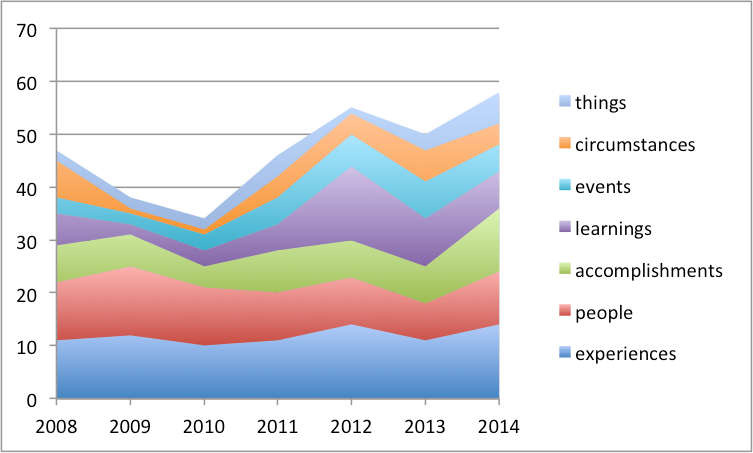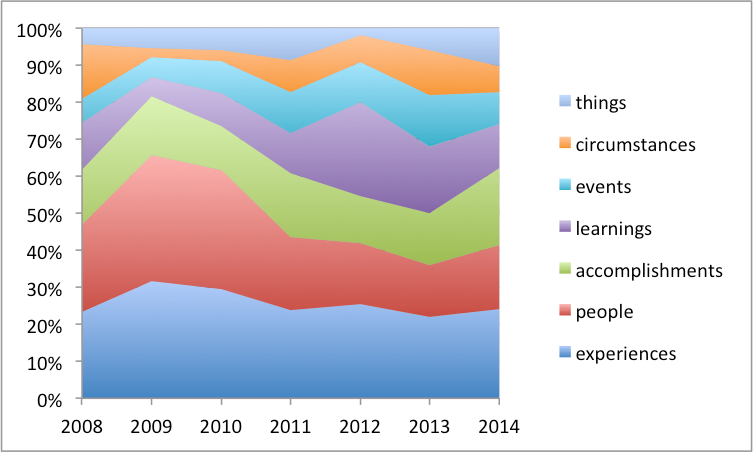
By Tiago Forte of Forte Labs
For the past 7 years, I’ve kept a list of everything I’m thankful for.
I started the list in 2008, on New Year’s Eve, on a beach in Brazil. Thinking back over a year of studying abroad, feeling overwhelmed with gratitude for the experiences it brought me, I just had to sit down and write them out.
I made it a tradition from that point forward, using the waning hours of each year to jot down anything and everything that came to mind. These were not simple daily pleasures — they were things that stuck with me after weeks or months.
I turned 30 a few months ago, and decided to take a closer look at the list for the first time. I figured that if I was going to go through a soul-wrenching identity crisis over who I was and what I wanted from my life, I might as well make it retrospective instead of prospective.
I wondered:
“What if I could predict what will make me happy in the future
by looking at what has made me happiest in the past?
Turning 30 is like glimpsing for the first time the arc of time slowly bending back to where it started. It makes you curious about the past in a way you can’t be until you’re a decade removed from adolescence.
Opening this time capsule, I realized that past gratitude is an excellent predictor of future happiness. It is humble — acknowledging the journey over the destination, sharing credit with the forces of randomness, and taking hedonistic speculation (mostly) out of play.
I found I had recorded a grand total of 328 entries. 328 motives for lasting gratitude spread over 2,555 days. About one entry per week.
Some were flippant:
293. Standing desk
Others were more meaningful, such as the time I survived being held up at gunpoint by a drug trafficker named Chucky:
11. Surviving encounter with Chucky
Some in retrospect seem insignificant, but I know they brought me a lot of pleasure at the time:
245. Loose-leaf tea
While others presaged experiences that would change me forever:
21. Peace Corps nomination
Some made me laugh, remembering the terror of my Ukrainian landlady, who liked to “visit” (i.e. barge in unannounced) every few weeks:
155. Escaping Olga’s grasp
While others saddened me, as I remembered friendships that have faded away:
35. Friends in Curitiba
And finally, for many entries, what once seemed like an exhilarating blessing that I would never forget, has now faded into the background of my awareness, as new worries take center stage:
156. LASIK surgery
Here’s a few other things I discovered when I gave the list some structure.
1. My gratitude falls into 7 categories
I was surprised to find that my 328 motives for gratitude could be fairly easily categorized into 7 main groups:
- Experiences: 76 entries
- People: 75 entries
- Accomplishments: 51 entries
- Learnings: 46 entries
- Events: 33 entries
- Circumstances: 27 entries
- Things: 20 entries
This aligns pretty closely with most research on happiness, but it was neat to see it emerge on its own.
2. Gratitude is relative to expectations
I noticed that my feelings of gratitude were not an objective indicator of what I most appreciated in my life at any given time. They were, instead, largely a function of how much reality exceeded my expectations.
For example, in the People category, I had far more entries for “friends” than for “family,” not because I don’t appreciate my family, but because I sort of expect them to always be around.
In the Circumstances category, I found 6 entries under “others’ success,” but only 2 under “others’ health” and 1 under “others’ safety.” I’m guessing this corresponds to the baseline of what I take for granted: health and safety are more of a given, whereas it stands out more in my mind when someone I care about has a notable success.
3. Purpose-driven accomplishments matter more
I was very curious to dive into Accomplishments, since like most people my age I spend a lot of my time and energy pursuing them.
The first thing I uncovered is something I already knew: I find work rewarding. 27 entries fell under “professional accomplishments,” with the remaining 23 split between “personal,” “creative,” “financial,” “academic,” and “health,” from most common to least common.
Looking more closely at the 27 professional accomplishments I was most grateful for since college, I wanted to know what qualities made them meaningful to me, in the hope that I could optimize for these qualities in the future.
I rated each entry on 5 criteria (building on Daniel Pink’s criteria for professional satisfaction in Drive). Normalizing the scores on a 1–10 scale resulted in:
- Purpose: 6.9
- Recognition: 6.9
- Autonomy: 6.3
- Mastery: 4.8
- Profit: 3.4
No complete surprise here, but it does make sense: the highest-rated entries overall were in 2 groups: projects I completed while in the Peace Corps (primarily purpose), and the launch and growth of my company Forte Labs (primarily autonomy). The low mastery score also fits: I’ve always been a “jack of all trades, master of none,” and find myself skipping around a lot.
Of course, since this analysis is retrospective, it might just be that I haven’t experienced a lot of mastery or profitability so far!
4. Experiences are multi-faceted and evolutionary
Experiences was my largest category, but diving deeper into it, I realized that these memories are very multi-faceted, and change over time.
Here are the subcategories I came up with:
- Service: 17 entries
- Community: 13 entries
- Relationship: 10 entries
- Travel: 10 entries
- Work: 10 entries
- Family: 9 entries
- Cultural: 5 entries
- Learning: 3 entries
- Self-knowledge: 3 entries
- Appreciation: 2 entries
- Entertainment: 1 entry
I shouldn’t be surprised to see service at the top, since 2 of those 7 years were spent in the Peace Corps. But I see this value manifested in other areas as well: I’ve learned to sail over the past year and, after getting my skipper rating a few months ago, I’ve found giving lessons to novices to be a lot more rewarding than learning advanced maneuvers or racing.
I also noticed that what I appreciated most about an experience evolved over time. When I first arrived in Bogotá as a tourist, it fell into the subcategory of “travel.” A few weeks later, settling down to live and work in Cartagena, I came to appreciate “culture.” Only later, after months living with a Columbian family, working for a local nonprofit and making friends, did my gratitude shift to focus on “community.”
I suspect this is why I prefer immersing myself in one place when I’m abroad, rather than traveling around — it takes time to build a community.
5. What I’m grateful for reflects my life stage
Looking longitudinally over my entries by year, I seem to be getting quantitatively more grateful over time (or at least, more thorough):

Here’s the same graph, but using relative values to compare years directly:

A step back through the looking glass
So what did I take away from this experience, besides subjective “insights” that I already knew?
First of all, it almost goes without saying, I feel pretty incredulous that I’ve had this many things to be grateful for, period. The fact that I have to make lists and create graphs out of them suggests an absurd number of things I’ve had the privilege of experiencing.
I see echoes of the person I used to be in this list, and I empathize deeply with him. I see an insecure young man wanting to prove himself:
44. Proving I could survive and thrive on my own
And I remember how much I had to learn:
46. Dating experiences
Understatement of the century, right there.
I didn’t know, back then, what I was good at, what made me happy, what I wanted. I especially didn’t know what I didn’t know.
Which makes me think: I wonder if in 7 years, I’ll look back and think the same about my current self? Even the possibility gives me an unusual feeling of compassion for my current self.
It’s ok not to know. It’s ok to feel confused and lost sometimes. Every single thing that happens, every thought and emotion, is designed to teach me something, if I’m willing to receive it. Every moment contains something worth being grateful for.
The moment you “add something to the list,” whether on paper or in your head, you change not only how you see something, but the effect it has on you. In a strange sense, in order to bring into your life more things worthy of gratitude, you have to start by giving thanks for what’s already there.
I realize that gratitude is not a fixed quantity. A list like this one is not merely a mirror reflecting some objective reality. It is a lens, with the power to reinterpret anything — any mistake, any failing, any trauma, any crisis — as the seed of something good. I think gratitude is a skill: the more you practice viewing things through this lens, the more appear.
This exercise gave me a great sense of perspective. It is like a bird’s eye view of my past, looking back over the terrain I’ve covered so far, and seeing only the peaks.
Is this a dishonest way of remembering? Maybe. Speaking with a friend recently, she pointed out that with most of our childhood memories, we don’t actually retain the original experiential memory — instead, we have a “memory of having the memory,” reinforced and probably altered over years of retelling and reminiscing.
If all memory is subjective, I’d prefer to see it in terms of the gifts it has given me. If perception makes reality, this sounds like a great way to live the next 7 years.
Follow us for the latest updates and insights around productivity and Building a Second Brain on Twitter, Facebook, Instagram, LinkedIn, and YouTube. And if you're ready to start building your Second Brain, get the book and learn the proven method to organize your digital life and unlock your creative potential.
- POSTED IN: Emotions, Goals, Habits, Personal growth, Self-tracking, Workflow
